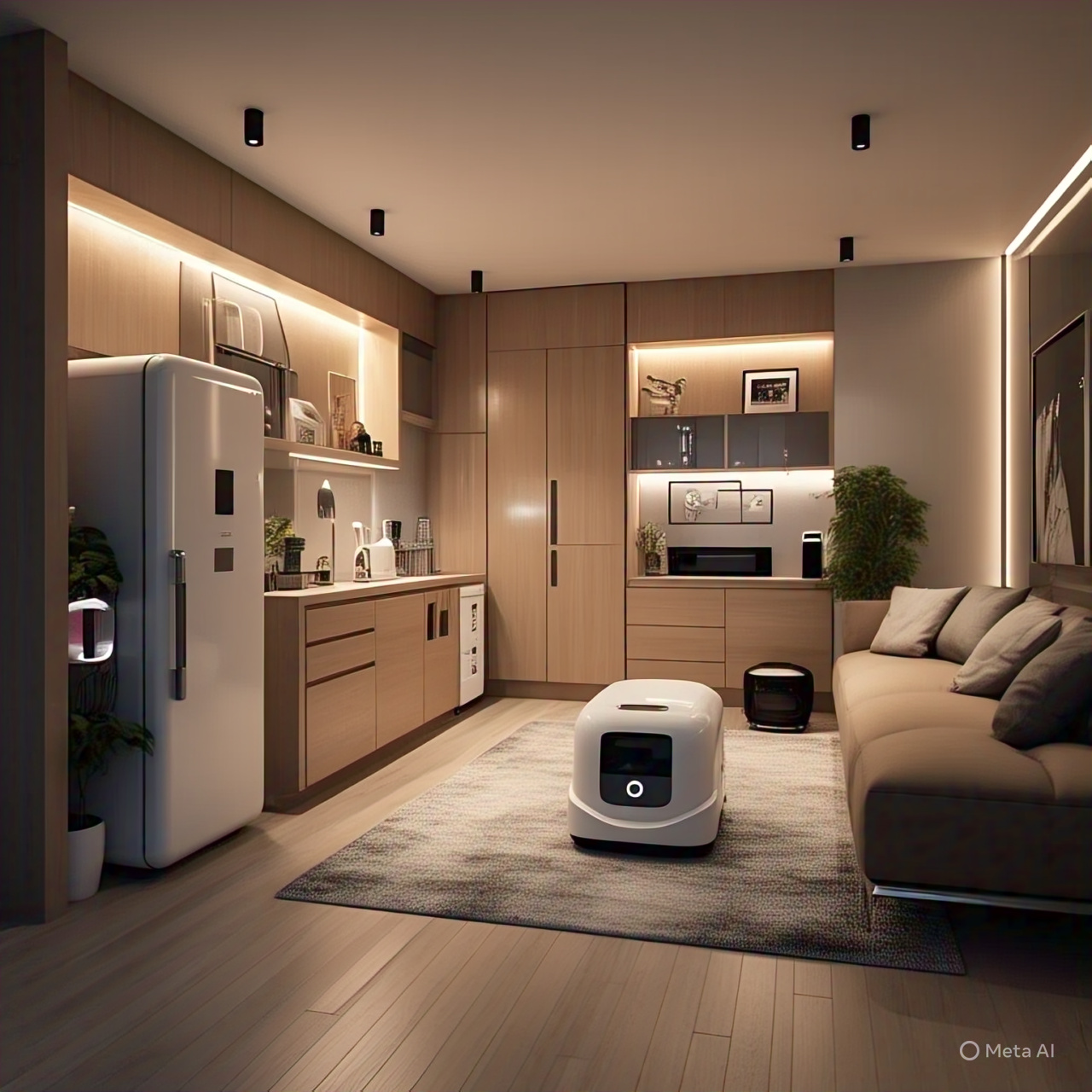
artificial intelligence in smart devices
A key component of the technological revolution that has transformed our world is the artificial intelligence in smart devices. This powerful combination is reshaping our relationship with technology and making our lives smarter, more efficient, and more personalized.
✅ What Are Smart Devices?
-
Connected to a network, most often the internet
-
“Smart” electrical equipment may perform both autonomous and interactive tasks
-
These devices gather data, make decisions, and learn from human actions
-
Common examples:
-
Smartwatches
-
Security cameras
-
Voice assistants
-
Smart TVs
-
Smart fridges
-
Smart thermostats
-
🧠 What Is Artificial Intelligence?
-
A computer or machine is said to have AI if it can mimic human mental processes
-
Involves:
-
Learning
-
Reasoning
-
Self-correction
-
-
Used in:
-
Autonomous vehicles
-
Speech recognition
-
Decision-making systems
-
🔗 How AI Is Linking Up With Smart Devices
-
AI enables smart devices to learn routines and adapt
-
Example: AI-powered thermostats learning your preferred temperature
-
Devices become proactive rather than reactive
🔍 AI Features That Smart Devices Must Have
-
Behavior-based learning: Detect patterns in user behavior
-
Voice interaction: Enables natural communication
-
Automating processes: Reduces manual intervention
-
Demand forecasting: Predicts future needs based on past usage
🏠 AI for Smart Home Control
-
Central to modern smart homes
-
Integrates with:
-
Home automation systems
-
Appliances
-
Lighting
-
Temperature control
-
-
Example: Lights turning off automatically when you start watching a movie
📱 Smartphones with Artificial Intelligence
-
Examples: Siri, Google Assistant, Bixby
-
AI features:
-
Enhanced camera through object detection and setting optimization
-
Power management via adaptive performance
-
Personalized user experience
-
-
Smart TVs also:
-
Suggest content based on preferences
-
Adjust video/audio based on content
-
Use voice/facial recognition for customization and security
-
🧊 Intelligent Devices That Use AI
-
Smart refrigerators: Recommend recipes based on available items
-
Washing machines: Use AI to measure load and adjust water usage
-
Ovens: Auto-cook with perfect temperature presets
-
Robotic vacuums: Learn room layout and optimize cleaning routes
🚗 AI in Autonomous Cars
-
Includes:
-
Adaptive cruise control
-
Lane-assist
-
-
AI enables:
-
Voice control for music, calls, navigation
-
Monitoring driver behavior for safety
-
Battery efficiency through predictive AI
-
🔐 AI and Intelligent Security
-
Facial recognition for familiar/suspicious individuals
-
AI enhances motion detection accuracy
-
Smart locks analyze usage patterns
-
Real-time updates via mobile apps
🗣️ AI-Powered Virtual Assistants
-
Devices: HomePod, Google Home, Amazon Echo
-
Capabilities:
-
Control smart devices by voice
-
Set schedules and reminders
-
Answer questions
-
Learn through continued use
-
🎯 Benefits of Artificial Intelligence in Smart Devices
-
Personalization: Devices adapt to preferences
-
Efficiency: Automated processes save time
-
Energy saving: Optimized power consumption
-
Accessibility: Easier interaction for people with disabilities
⚠️ Problems with Data Protection and Safety
-
AI systems collect and store user data
-
Without security, smart devices can be hacked
-
Users must manage privacy settings carefully
-
Manufacturers developing:
-
Better encryption
-
Advanced AI threat detection
-
📘 Educational and Learning Tools with AI
-
Personalized learning experiences
-
Smart tablets monitor progress and adapt content
-
Voice assistants help with:
-
Definitions
-
Assignments
-
-
Teachers and parents can track learning patterns

❤️ AI-Powered Health and Wellness Devices
-
Wearables monitor:
-
Heart rate
-
Sleep quality
-
Oxygen saturation
-
-
AI detects health risk patterns
-
Meditation apps adjust based on mood
-
Machine learning reminds you to:
-
Drink water
-
Take medication
-
😴 AI Technology for Tracking Sleep
-
Smart beds adjust:
-
Temperature
-
Firmness
-
Posture
-
-
Sleep trackers:
-
Detect patterns
-
Suggest improvements
-
-
AI syncs lights and sounds to enhance sleep
🏃 AI in Fitness Gear
-
Devices: Smart bikes, treadmills
-
Provide:
-
Personalized workouts
-
Real-time analysis
-
Progress tracking
-
Break and activity reminders
-
-
Integration with nutrition apps balances intensity and intake
😊 Emotional AI in Smart Devices
-
Understands and responds to human emotions
-
Adjusts:
-
Lighting
-
Music
-
Environment
-
-
Creates relaxing or energizing surroundings
🤖 The Function of Machine Learning
-
Enables learning from user behavior
-
Devices get smarter with usage
-
Helps with:
-
Facial recognition
-
Voice understanding
-
Pattern detection
-
🧰 AI-Enabled Maintenance & Troubleshooting Tools
-
Predicts issues before they occur
-
Provides step-by-step instructions
-
Connects with support for remote troubleshooting
🛒 AI for Intelligent Retail Devices
-
Suggests products via smart kiosks
-
In-store smart mirrors display virtual outfits
-
Personalized ads based on past purchases
-
Real-time stock optimization
🎮 AI in Video Game Systems
-
Detects user behavior
-
Adjusts difficulty dynamically
-
AI-controlled opponents challenge players
-
Smart VR systems modify scenes intelligently
🏢 AI-Powered Smart Workplace Devices
-
Intelligent assistants:
-
Manage calls
-
Schedule meetings
-
-
AI optimizes:
-
Room lighting
-
Temperature
-
-
Smart whiteboards:
-
Read handwriting
-
Digitize notes
-
-
Emergency features:
-
Detect motion or gas leaks
-
Alert emergency contacts
-
🌍 AI’s Impact on the Environment
-
Reduces energy consumption
-
Smart irrigation systems cut water waste
-
Solar panels track sun positioning
-
Lowers emissions via optimized schedules
🚀 The Future of Artificial Intelligence in Smart Devices
-
Deeper learning and intuitive responses
-
Fully integrated smart home ecosystems
-
AI may handle:
-
Laundry
-
Grocery orders
-
Errands
-
-
Emotional intelligence in devices for human-like interactions
⚙️ Challenges with Advanced AI Devices
-
High costs
-
Inconsistent global data privacy laws
-
Compatibility issues across brands
-
Over-automation may be overwhelming for some users
📝 In Summary
Intelligent devices powered by artificial intelligence in smart devices are here to stay; they will revolutionize efficiency, convenience, and personalization.
-
From home comfort to health management, smart devices are evolving fast
-
The future promises greater adaptation and ease in daily life
-
AI in smart devices ensures safety, saves time, and adds comfort
-
As AI continues to advance, the synergy with smart tech becomes even more powerful
-
The future of artificial intelligence in smart devices is not only promising but inevitable
🔁 Final Thoughts
As smart devices continue to evolve, it’s evident that artificial intelligence in smart devices is not going anywhere. Its role in shaping modern life is undeniable—from enhanced security to fully personalized user experiences.
Leave a Reply